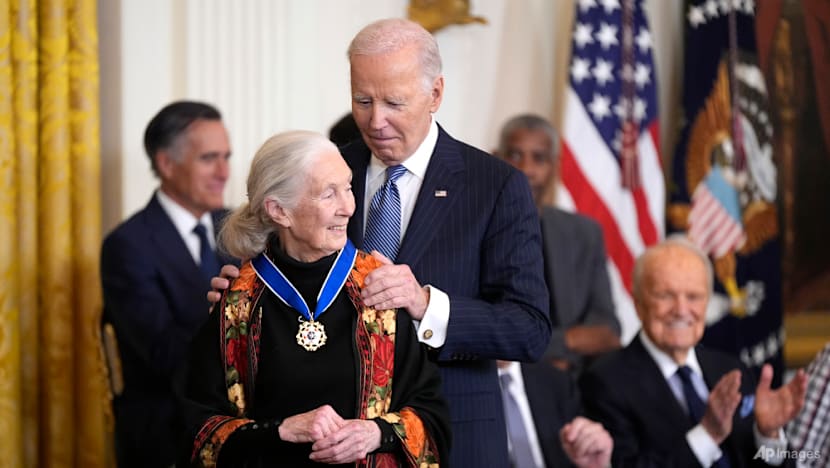Renowned British chimpanzee expert Dr Jane Goodall dies at 91
The British primatologist became one of the world's most prominent wildlife advocates.

FILE PHOTO: English Dr. Jane Goodall, chimpanzee researcher and naturalist, observes through glass some of Taronga Zoo's 25 member chimpanzee colony in Sydney, August 31. Goodall, who has spent most of her life studying chimpanzees in Africa is in Australia to raise awareness that chimpanzee numbers in the wild have plummeted 75 percent in 10 years leaving only 250,000 in their homelands of Central and West Africa. AUSTRALIA/File Photo
WASHINGTON: British primatologist Dr Jane Goodall, who transformed the study of chimpanzees and became one of the world's most prominent wildlife advocates, has died at the age of 91, her institute announced Wednesday (Oct 1).
Goodall "passed away due to natural causes" while in California on a speaking tour of the United States, the Jane Goodall Institute said in a statement on social media.
"Dr Goodall's discoveries as an ethologist revolutionised science, and she was a tireless advocate for the protection and restoration of our natural world," the statement added.
Born on April 3, 1934, in London, Goodall's fascination with animals began in early childhood, when her father gave her a stuffed toy chimpanzee that she kept for life. She was also captivated by the Tarzan books, about a boy raised by apes who falls in love with a woman named Jane.
In 1957 she travelled to Kenya at the invitation of a friend, where she began working for the renowned palaeontologist Louis Leakey.
Her breakthrough came when Leakey dispatched her to study chimpanzees in Tanzania. She became the first of three women he chose to study great apes in the wild, alongside American Dian Fossey (gorillas) and Canadian Birute Galdikas (orangutans).

Goodall's groundbreaking observations included her discovery that chimpanzees use grass stalks and twigs as tools to fish termites from their mounds.
On the strength of these findings, Leakey encouraged her to pursue a doctorate at Cambridge University, where she became only the eighth person ever to earn a PhD without first obtaining an undergraduate degree.
In 1977, she founded the Jane Goodall Institute to further research and conservation of chimpanzees. In 1991, she launched Roots & Shoots, a youth-led environmental program that today operates in more than 60 countries.
Her activism was sparked in the 1980s after attending a US conference on chimpanzees, where she learned of the threats they faced: exploitation in medical research, hunting for bushmeat, and widespread habitat destruction.

From then on, she became a relentless advocate for wildlife, travelling the globe well into her 90s.
"The time for words and false promises is past if we want to save the planet," she told AFP in an interview last year ahead of a UN nature summit in Colombia.
Her message was one of personal responsibility and empowerment: "Realise every day you make a difference."
"Each individual has a role to play, and every one of us makes some impact on the planet every single day, and we can choose what sort of impact we make."













